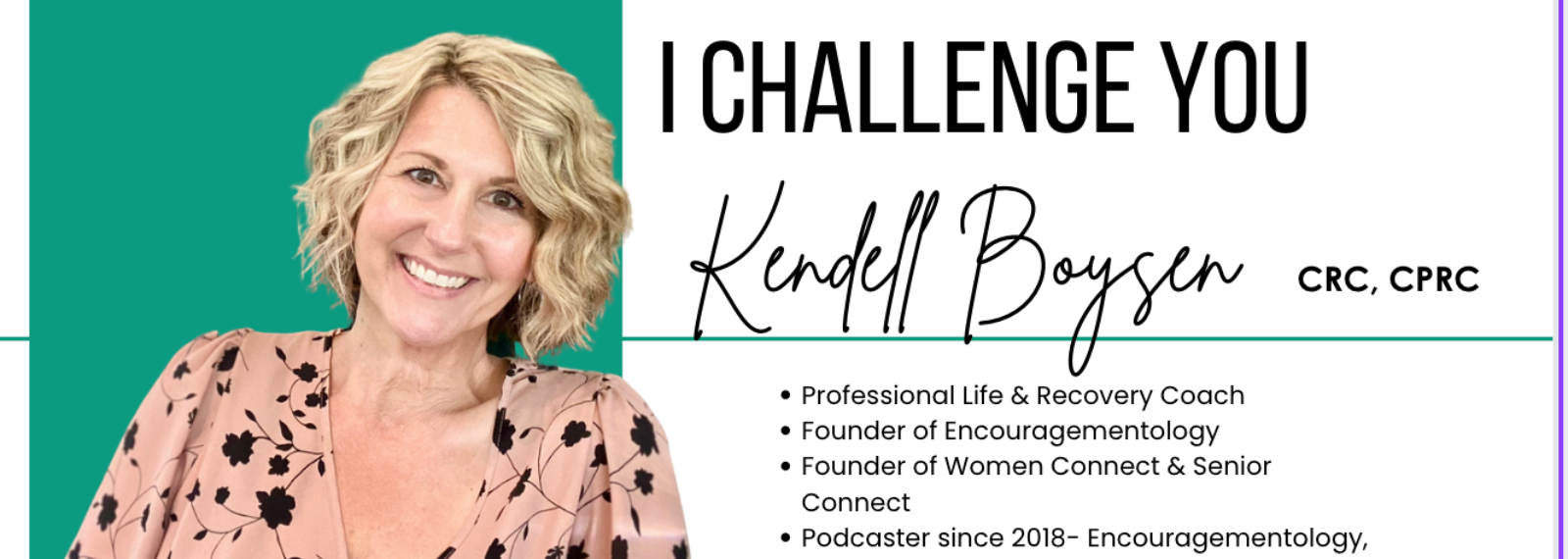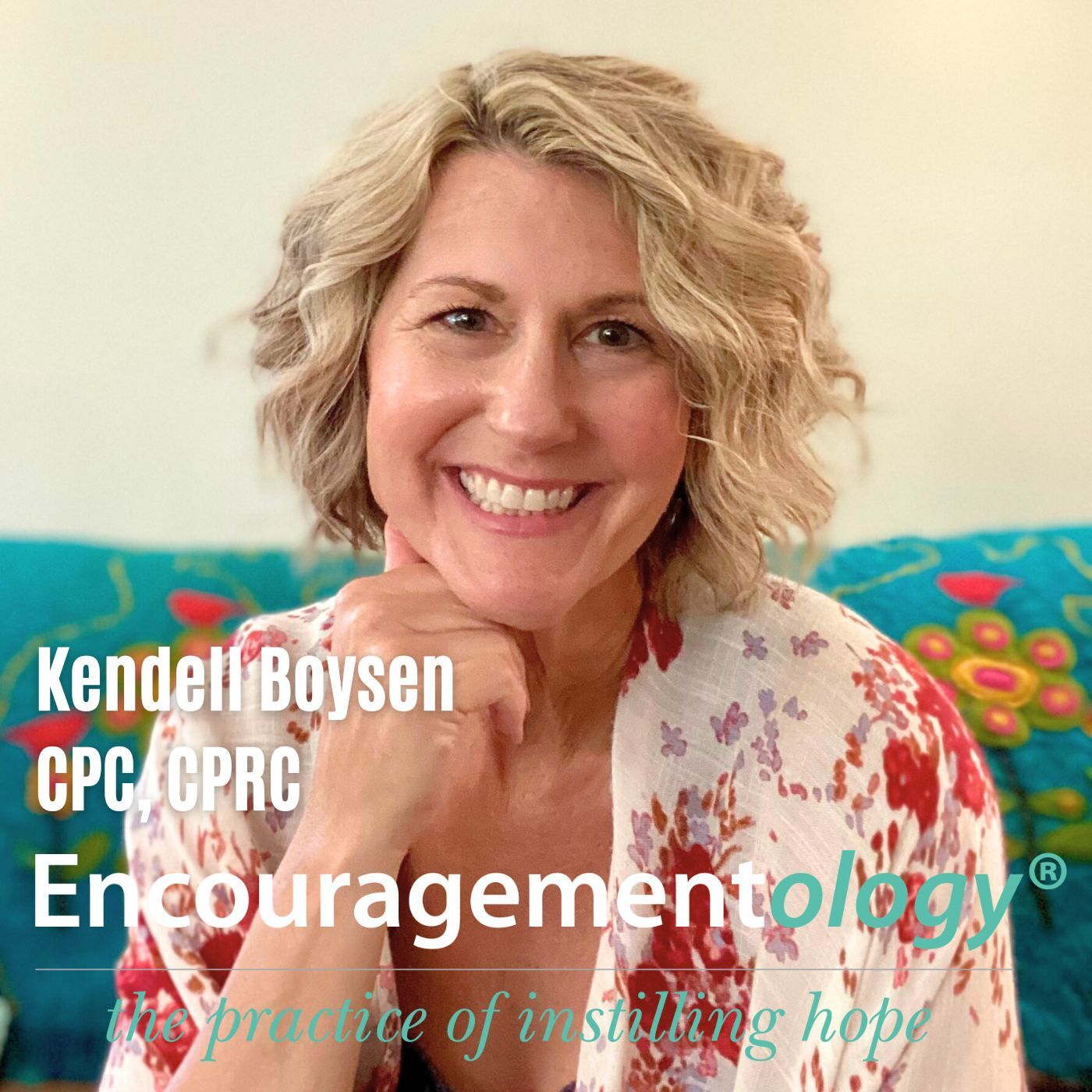Episodes
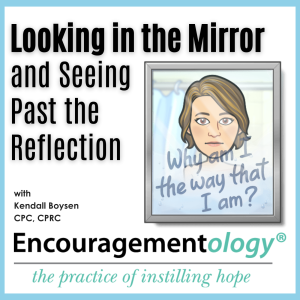
Tuesday Sep 07, 2021
Looking in the Mirror and Seeing Past the Reflection
Tuesday Sep 07, 2021
Tuesday Sep 07, 2021
SHOW NOTES:
On this show...we’re making eye contact and exploring deeper as we look in the mirror to see past the reflection. Maybe you have all the confidence a person can exude, top of your game, celebrating you in your own skin. But chances are, as tough as you present yourself to be, there are times when weakness wins and self-doubt and criticism creep in. Some of the strongest people you may think you know are dealing with self-esteem issues that at times are crippling. Following the mottos “never let them see your sweat” and “always put your best foot forward”, these struggles can be private and lonely. Suffering in silence and desperately seeking self-love. Today, we’re coming clean, being honest with ourselves, and showing a bit of vulnerability. Today, we are going deeper and looking for more.
This can be a heavy subject, I mean, self-love is kind of complicated. To some it may sound like this eutopia or mirage; something we should all be striving for but secretly know we’ll never get there. It can also feel like a blanket statement…” you need to love yourself”. What does that really mean? Not to be too practical but goal setting is only successful if you can create goals that are meaningful to you, are something you are truly interested in pursuing, and have some level of attainability. Shouldn’t self-love be the same?
Maybe we need to get more specific. In order to do that, we need to see where our hangups lie. Pushing against that idea you either love or hate yourself, maybe it’s more granular than that. You love certain aspects, aren’t fond of others, and downright loathe a few.
Exerts from the content:
To help clarify, let’s be clear on what self-love is not.
- Entitlement
- Selfishness
- Sinful
- An Excuse
Sometimes we get self-love and self-care intertwined to the point that we confuse a long bubble bath and a pedicure with mental health and happiness. More pedi’s fewer pity parties. Don’t get me wrong, a good soak for your feet or your whole self is not a bad thing and does lead to relaxation and a warm happy feeling but remember, we are looking past the reflection and going deeper. There is more that makes up this recipe of natural self-love...the love of yourself, mind, body, and spirit. The unique characteristics that make you, you. Your special gifts, points of view, and deep-seated morals.
Not as easy as it sounds but anything worth having is going to take some effort.
Exerts from the content:
Louise Hay, author of the best-selling You Can Heal Your Life, and founder of publishing company Hay House, died at age 90 years old.
As one of the most prominent figures in the self-development movement, Hay wrote dozens of books and dispensed plenty of wisdom, yet her philosophy almost always came back to the transformative power of self-love. As she said herself: "I found that there is only one thing that heals every problem, and that is: to love yourself."
I just started growing a garden. I know, I know, I’m a little late to the game. I’ve always had a self-proclaimed black thumb, realizing air plants don’t in fact eat air, they still need water to survive. Who knew?? At any rate, I’m excited by this newfound adventure of growing my own healthy and organic food!
A packet of seeds is where it all starts. Each little individual seed is planted in the earth. Spaced out with room to grow. From here it takes nature cooperating, ie sun, rain, and descent temps. But it also takes me filling in the gaps. Noticing when they are dry, attracting bugs, getting overshadowed by weeds, or plucked up by a bunny. Most importantly….patience. Some will pop through the soil faster than others, some will be hearty, and some will take more time and care. Some will yield produce and some won’t make it. How will I adjust my process to produce a better outcome next time?
At this point….you’re ready to move into problem-solving mode right? What can we do to cultivate more love for ourselves? Nurture our seeds to produce a healthy crop. Well, remember the garden and patience?
Exerts from the content:
Mirrors can evoke strong feelings in us – and they can also be incredibly powerful tools for changing our perspective and seeing parts of ourselves that are usually hidden as we look out into the world.
Instead of searching outside myself for people, places, and things that would distract me from negative emotions or self-criticism, I used the mirror to face myself and ground myself by simply looking into my own eyes with compassion. I found the mirror was a great way to work out my emotions, too.
Ok, Tara...I for one am going to take this challenge! It truly is a challenge for me. There are so many things I appreciate about myself. My laugh (as obnoxious as it may sound to others) it’s genuine and comes from the heart. I love that I find a lot of things humorous, including myself! I like my smile for some of the same reasons. I smile a lot because I’m engaged and intrigued or amused. I’m curious and enjoy connecting and encouraging - all these things bring out my smile which is a window to my soul. I love my curious mind, the way it cares, observes, problem-solves, and prompts my body to take action. It lights up when I can brainstorm, especially with others!
I like my courage and the fact that I’m bold. I approach everything I do with the mindset that I DO have the ability it takes to succeed. I’m not afraid to try and fail and I appreciate that my failures provide motivation instead of crushing my bold spirit.
I’m tough on myself when it comes to my body and my lack of motivation to push it harder. I am a firm believer that if you want something to happen you make it happen instead of willing it to do so YET each morning I stare at myself with harsh judgment and shame. I brought three beautiful souls into this world but instead of celebrating that miracle when I look at myself, I only see what happened as a result. Shallow? Well sure...normal? You betcha.
Darlene Lancer bails us out with 7 Ways to Cultivate Self-Love found at psycentral.com
- Exerts from the content:
- Self-Acceptance
- Self-forgiveness
- Self-Appreciation
- Loving Actions
- Practicing Gratitude
- Self-Love Visualizations
KEY HIGHLIGHTS
- All too often we seek love from others, before looking within.
- . A critical component in self-love is recognizing your limits, needs, and worth, and asserting intrapersonal and interpersonal boundaries as needed to uphold them.
- "I found that there is only one thing that heals every problem, and that is: to love yourself."
- Remember, radical self-love isn't a bumper sticker or a fridge magnet saying. It's a paradigm shift that is as challenging as it is rewarding.
- patience, care, mindfulness, modification, and commitment are all necessary and can be applied to all mile markers on your journey.
- kinder self-awareness is the key to breaking free from the inner critic and the external world that stokes our fears and anxieties that we are never safe, never good enough, and never have enough.
- We are all born innocent and worthy of love.
- Your mind is a garden, your thoughts are the seeds. You can grow flowers or you can grow weeds.
- Self-acceptance is greater than self-esteem, and self-acceptance paves the way for self-love
- fulfilling our needs and wants is an act of self-love that lifts our spirits. It’s a key to happiness that calms and revitalizes us.
CHALLENGE: Ready your soil by taking time to cultivate self-love. Plant your seeds; wants, needs, and desires firmly with a commitment to make yourself a priority. Enjoy your harvest, a true reflection of your soul.
I Know YOU Can Do It!
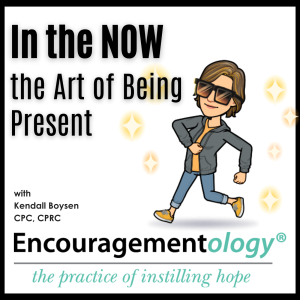
Tuesday Aug 31, 2021
In the NOW, the Art of Being Present
Tuesday Aug 31, 2021
Tuesday Aug 31, 2021
SHOW NOTES:
On this show...we will raise our hand when called, sitting up straight, and being present as we transport ourselves in the NOW. How many hours in the day do you spend rehashing a time past; fond memories, past mistakes, lost loves, easier times, or devastating tragedies? Maybe you focus on time travel as you brainstorm about the future; better times, new ventures, finally arriving, potential love, or the right recipe to finally achieving happiness. Wherever you are today, why not try the here and now. Today, at the moment, as it happens….the art of being present. Is it possible to live life without expectations? Relying on who you are today to get you through the hour. So many minutes, hours, days, months, years are spent mentally traveling through time instead of drinking in the special moments made in the NOW.
I for one struggle with the NOW. I’m busy, busy, always planning and doing and before I know it, a whole day has gone by and I’m exhausted. I love to brainstorm new ideas and make grand plans. What could be? For me, these aren’t just pipedreams but in most cases, something I activate and add to my plate.
Meditation always seemed to slow. I would sit there waiting for something to happen and my mind would be in a million different places. The first time I tried yoga I thought the same thing - this isn’t exercise! Before that rubs you the wrong way I now know my line of thinking was all skewed. I kept thinking I was supposed to be pushing myself, huffing and puffing. Then one day I was able to relax my mind and concentrate on what I was doing at the moment and I found it both challenging and relaxing.
The relaxing part for me was giving my mind a break. I’ve always said if mind racing burnt calories I would be in such great shape haha. I have yet to be consistent with anything but burning the candle at both ends but this IS something I strive for. So here, in the now, I’m saying it to all of you. My goal is to create more moments throughout my day to give my mind a treat, relax, and just BE.
Exerts from the content:
Some people focus on what “should” have happened or what “should” happen instead of on what “is” happening. They blame others for slights that occurred decades ago and unfortunately, they are usually the only one who remembers this. They have difficulty forgiving others or themselves and this prevents them from letting go and moving forward in a healthy manner.
No matter what your situation, you always have the option to change. We are all able to restart our life if we make the decision to do so, but your way of thinking has to change.
I realize letting go of an old way of thinking may not be as easy as it sounds. “Just let go” or “get over it!” - our minds have a nasty habit of running away with our thoughts and the logical you, feels like you’re chasing it down saying “HEY give that back!”. But there are ways to start the process of asserting more control.
And that may be where you are on your journey. You’ve hit the mile marker of starting to become more aware of these habits in order to make a shift. Perfect. Let’s start there…
Exerts from the content:
The 3-time perspectives of the human mind
Past, Present, and Future
The 1/9/90 principle of time perspectives
1% past-focused: I take about 15 minutes a day to journal. But I don’t just think about the past when I journal. I try to occasionally reflect on the past to learn.
9% future-focused: This is the time I dedicate to planning and thinking about the future. I always want to be aware of the fact that life can be long. For example, I spend time creating fitness routines and buying healthy food because I know that’s better for future-me.
90% present-focused: This is when I execute my plans and the time I spend enjoying my days. While I might plan only 9% of the time, the actual work happens here: Working out, writing, reading, doing chores, eating, traveling, and so forth. I don’t want to be lost in thought when I do these things.
It’s hard to embrace the joy of the NOW when you believe your best times have already come and gone. Remember the “easier times” you know - before bills, responsibility, complicated relationships, children. The time in your life when it was all about you.
Exerts from the content:
Introspection can lead you to learn more about yourself.
Rumination – regret and ‘wheel spinning'
Telling the difference between rumination and introspection
- If you feel that you are drawing lessons from the past, or enjoying the past then it's more likely that you're being introspective. On the other hand, if your thoughts about the past are full of regrets and bitterness, or your thoughts have a repetitive automatic quality, it's likely that you are ruminating.
Visualizing yourself where you want to be and what you want to be doing is important in creating goals and harnessing the motivation to reach them. But where is the balance? Remember talking about the pendulum swing from extreme to the extreme? In all things, a healthy balance is an ultimate goal.
Listen to the show for this wonderful perspective
- PREDICTION IS HARD
- ADAPTATION IS KEY
- BALANCE DREAMS WITH WORK
KEY HIGHLIGHTS
- Create more moments throughout your day to give your mind a treat, relax, and just BE.
- When your thoughts, feelings, and behaviors are devoted to the past or the future, you are robbing today!
- You cannot reach your potential and make good choices if you are trying to resolve issues from the past or predict the future.
- Sometimes people focus all their energy on what hasn’t even happened yet.
- Awareness of time perspectives helps you enjoy your days, learn from the past, and shape a better future.
- Ultimately, we all want to make the best use of our time. So no matter what you do, don’t wait for life to bring you joy, clarity, or purpose.
- Rumination -rather than being a way out of problems, it's often a way to replay our failures and torture ourselves.
- Visualizing yourself where you want to be and what you want to be doing is important in creating goals and harnessing the motivation to reach them.
- One of the things people think about the future is that they will have more spare time. And there is no evidence that we'll have any more spare time in the future.
- Just about every success story also involves a lot of hard work.
CHALLENGE: take ownership over your mental mind travel to find a healthy balance of past, present, and future. Set your sights on letting go of what has already happened to make room for what is yet to go. Add action to your daydreaming so you can spend the majority of your time in the NOW, enjoying life as it unfolds.
I Know YOU Can Do It!
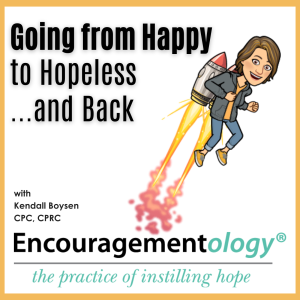
Tuesday Aug 24, 2021
Going from Happy to Hopeless...and Back
Tuesday Aug 24, 2021
Tuesday Aug 24, 2021
SHOW NOTES:
On this show...we are examining the pendulum swing; going from happy to hopeless...and back. This swing could play out over a lifetime or it could feel like it happens in an instant, over and over. Emotions are a tricky thing and unique to you. We aren’t talking about what is “normal” we are talking about what’s going on with you or someone you know. The good thing about a swing is that it will come around again so in some cases it’s about weathering the storm, reaching out for support and comfort, and trusting in your ability to right the ship. Ultimately, YOU have power over your thoughts and reactions, and even when it feels like you’ve lost all control and your emotional rollercoaster is taking too long in the dips, you still have options. Just recognizing that this isn’t the way you want to live is the first step...on this show, we’ll talk through the others.
So let’s check in with ourselves and be honest, how fast does your pendulum swing? Today we are talking about Happy to Hopeless but you might find calm to anxious, sweet to sour, agreeable to angry...you fill in the blanks. Your emotions are anything but even keel, calm, or consistent.
All those highs and lows have left you wondering what the heck is going on and feeling like a mess. Must be the way you’re wired right? Something you learned from the people who demonstrated that kind of behavior first or as a result of something or someone.
Most of us accept and justify our own behavior blaming others or promise to work on it someday. Or better yet, claim to be “working on it” without a clue as to why or how. As a result, one minute you’re on top of the world, loving life, and the next thing you know, nothing is going right now or ever will.
To be clear, I am in no way making light of depression or acting as if “choosing happy” is the answer. Hopefully, we will touch on all points to give some new insight. But if you’re listening and feeling hopeless and unable to find a way out - please reach out, there are resources that will help get you through this dark time in your life. Don’t suffer in silence.
Maybe this is a new and confusing time in your life and you’re still trying to figure out what you’re dealing with.
Exerts from the content
While anyone can experience some of these symptoms from time to time, a doctor will only diagnose depression when a certain cluster of symptoms appear, and they persist for 2 weeks or longer.
- Feeling sad or empty
- Feeling hopeless or helpless
- Feeling worthless
- Feeling excessively guilty
- No interest or pleasure in activities
- Anger and irritability6. Anger and irritability
- Feeling tired and a loss of energy
- Insomnia or lack of sleep
- Difficulty concentrating, remembering, and making decisions
- Lack of appetite
- Overeating and weight gain
- Aches, pains, and physical symptoms
- Thoughts of death or suicide
So many factors combine to determine our moods and our abilities to effectively manage them.
Our age….learning and growing, striking out on our own, trying to make ends meet can be scary and overwhelming. I remember when I unlatched from my family and was flying solo - oh I thought I knew everything. I wanted to be the boss and make all my own decisions until the first hiccup and then I wanted to run back to the nest. Being responsible is terrifying when you are first starting out.
What about managing life, love, work, and family - holy cow there is only so much time in the day and it feels like we spend most of it at work! Everyone wants something from you AND at the same time. So many plates spinning and you’re petrified that you’ll drop one and people will figure out that you really don’t have it all together.
The kids move out, the house is empty, no one is asking questions or consulting you when big decisions are made. New blood comes into your workplace and you feel less important, your thoughts and ideas are “old school”, everyone’s making plans to slow down but you don’t feel accomplished yet...where did the time go?
You’re old….how in the world did that happen. Looking back it feels like it happened overnight. When you were young you thought about this day but it felt like forever away and now you’re here. Your 9-5 has come to an end, you have all the time in the world to do something cool but what? You don’t feel as good or as motivated as you once did. All you wanted was some peace and quiet and now you have an endless supply and it’s lonely. You remember when you couldn’t find an hour of free time in your schedule and now you wish you could find one hour of fun and togetherness.
No matter where you are in your life, your perspective is everything. Hope is the first syllable of Hopeless….so let’s focus on turning things around and sending that pendulum back the other way.
Amy Morin gives us 9 Things to Do If You Feel Hopeless in her article for verywellmind.com
Exerts from the content:
Consider That Your Brain Might Be Lying to You
But just because you think it, doesn’t mean it’s true. Your thoughts may be distorted, inaccurate, or downright wrong.
Argue the Opposite -When you feel hopeless, you’ll likely think about all the reasons why nothing will ever get better. So take a few minutes to argue the opposite.
How To Be Happy Again: 15 Tips To Rediscover Your Happiness - found at aconsciousrethink.com
Exerts from the content:
If you want to be happy again, it suggests that you were happy at some point in the past. The first step to finding that happiness again is to ask when and why you stopped feeling happy.
If you focus too much on happiness as an outcome, you will often find it harder to achieve that outcome. Happiness erupts spontaneously when the conditions are right.
Determine the recipe for your happiness and you will be better equipped to fill your life with the right ingredients
KEY HIGHLIGHTS:
- Remember. there is understanding to be had, responsibility to be claimed, and new ideas to embrace.
- Many factors combine to determine our moods and our abilities to effectively manage them.
- No matter where you are in your life, your perspective is everything
- Just because you think it, doesn’t mean it’s true. Your thoughts may be distorted, inaccurate, or downright wrong.
- Arguing the opposite might just open your brain up to the idea that things may not be as gloomy as you’re anticipating.
- Sometimes, you have to change your behavior first and the feelings might follow.
- There’s always something you can do to make things a little better or to help yourself feel a little better.
- I’ve learned from life that sometimes the darkest times can bring us to the brightest places
- Sometimes the very act of striving to be happy is what stands in the way of happiness.
- When you feel healthy, you are able to extract every last drop of goodness and happiness out of a situation.
CHALLENGE: recognize the swing of the pendulum and take action on finding the root of the problem. Argue the opposite as you push back on old perceptions embracing new perspectives. Remember, you can make it through whatever comes next.
I Know YOU Can Do It!
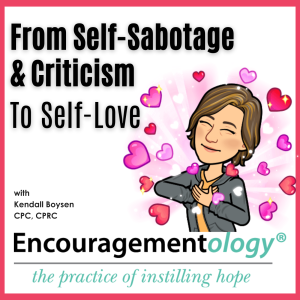
Tuesday Aug 17, 2021
From Self-Sabotage and Criticism to Self-Love
Tuesday Aug 17, 2021
Tuesday Aug 17, 2021
SHOW NOTES:
On this show...we are getting out of our own way, changing our narrative, and going from self-sabotage and criticism to self-love. Isn’t it time we end the war with ourselves? We can adopt all the media mantras; find gratitude, choose kindness, live, laugh, love...all the while, twisted in a love-hate relationship with ourselves. What do others see when they look at you? What do they mention when describing you or giving you a compliment? Is that even what you’re struggling with? My guess is no. We secretly despise things about ourselves that no one even gives a second glance or thought about. This creates self-doubt which interrupts our daily climb providing detour after detour. STOP….ok you’re at a stop sign and have the option of going left or right.
What blinker do you have on? Remember, the stop sign, the option of left or right? Let me help you out. Turn left promises hairpin curves, unexpected stops, steep inclines, followed by a rush of excitement as you make your hands-free descent (wait that might be a roller-coaster but you get the visual)...this is your journey to self-discovery. Each milestone offers rest and a scenic overlook onto freedom. Freedom from what you’ve been putting in front of your true potential.
Now, if you chose to go right you have a little more control because the path is familiar, straight away followed by a loop to repeat it over and over. Full of the potholes, and road-closed signs you’ve created along the way. You can pick up your speed here because you can predict when you will brake, skid, or run off the road. Predictable but far from safe.
So what’s it going to be? Is it time in your life to start doing things differently? What productive and positive thing has self-loathing and doubt ever produced in your life? Then why on earth do you protect it so fiercely?
Exerts from the content:
Self-loathing is that underlying feeling that we are just not good: not good enough, not good at this, not good at that, not good at – or for –much of anything.
The proper viewpoint toward yourself should be one of friendship. Think about yourself and treat yourself as you would a close friend; respectfully and with affection.
Becoming aware that a division exists within us allows for a more rational, reasonable assessment of events in our daily lives. Once we have identified this process as being different from honest self-reflection, we are then able to think more objectively about ourselves and the various situations we encounter.
Could it be as easy as changing our narrative? Sounds easy enough but the problem is so much of what we see is deeply rooted and continues to bubble up subconsciously. However, you can put yourself back at the crossroad but take control STOP. No longer am I going to listen to that broken record. Instead, I’m turning left and will begin to untangle the web of lies I tell myself by pushing back and challenging those beliefs. I do have a purpose, I am beautiful, I deserve good things in my life.
Exerts from the content:
Our stories determine our entire experience of reality. They shape our personality, thoughts, feelings, behavior, and worldview.
Make no mistake, the story you tell yourself about yourself is what will ultimately make or break you. So, is it a positive or a negative story?
If we view ourselves as helpless and downtrodden and at the mercy of an unjust and cruel world, we’re defeated from the very start. We’ll feel powerless and lost.
I would like to remember the specific day where I realized that enough was enough and I needed to find a new way. The day I learned I didn’t have all the answers yet but that there was so much more to learn. I keep racking my brain but I’m not sure it boils down to one major life event.
Someday, somehow, I realized, there is more to learn and much to love. I just had to get out of my own way!
Exerts from the content:
“How does this keep happening to me?”
You can sabotage yourself in a number of ways. Some are obvious, but others are a bit harder to recognize.
- Blaming others when things go wrong
- Choosing to walk away when things don’t go smoothly
- Procrastination
- Dating people who aren’t right for you
- Trouble stating your needs
- Fear of Failure
- Need for control
KEY HIGHLIGHTS
- No matter what circumstances you find yourself in, a nasty point of view toward yourself is never warranted.
- You are powerful in your own right, free to choose any point of view or course of action available to you.
- Challenging the tendency toward self-loathing is one of the most valuable uses of our time and energy.
- No longer am I going to listen to that broken record. Instead, I’m turning left and will begin to untangle the web of lies I tell myself but pushing back and challenging those beliefs.
- Whatever your life has been, and whatever role you’ve inadvertently cast yourself, it’s essential to recognize that you are the King or Queen of your own story.
- It’s time to recognize that and see yourself as the hero that you are.
- There’s nothing wrong with moving on from situations that don’t meet your needs.
- When you give up before you’ve put in much effort, you may not learn how to make different choices in the future.
- Wanting to avoid failure can lead you to avoid trying. If you don’t try, you can’t fail, right?
- Practicing mindfulness, or nonjudgmental awareness of your thoughts and behaviors in the present moment can also help.
CHALLENGE: Recognize the crossroad and come to a complete stop. Before you choose your direction make a commitment to let go of past behaviors and be willing to embrace a new perspective. Challenge the negative narrative with “not today” - today I’m turning left and continuing my journey to self-discovery.
I Know YOU Can Do It!

Tuesday Aug 10, 2021
Flexible or Agreeable? Bending to Please
Tuesday Aug 10, 2021
Tuesday Aug 10, 2021
SHOW NOTES:
On this show...we are getting honest with ourselves, opening the other eye, and asking a tough question; are we flexible, agreeable, or bending to please? You might identify with being easy-going or having a go-with-the-flow attitude. Never causing any waves and always blending in. Sounds nice and very agreeable but what if you are flexing and bending your belief systems, stepping out of your comfort zone, and compromising your values to please someone else? We all want to fit in and be accepted to some degree. Sometimes that degree is off the charts as we lose our identity in the endless pursuit for validation. How can we have it all; fit in and self-assert? It’s not as delicate of a balance as you might think. It starts with removing fear. When you operate from a place of how others MIGHT judge and criticize you, you lose your authenticity. What makes you, YOU. Let’s find that person and see what they have to say.
I always thought I was easy-going. Able to just relax and go with the flow. Matt cleared that up for me by reminding me of my lists, and schedules, and a need for “a plan”. Ok ok - he’s right. Maybe the word I was searching for was flexible or agreeable. I like people to be comfortable. I want to say YES more than I say no. I just want to make everyone happy…...oops, yep I just crossed the line.
I am a people pleaser. I never really identified with that term or the fact that it may not be a good thing. Who wouldn’t want to please people? What’s the alternative, make people mad? I definitely shy away from confrontation and I feel a little anxiety if anyone is in an uncomfortable spot. This might seem super emphatic but I have learned over the years that balance in everything, is everything. Even in our emotions.
- Distinguish position from person
- Offer a solution
- Back up your position
- State the business case
- Inquire before advocating
- Yes and…
- Concede defeat graciously
We all have ideas and things that are important to us. This is what shapes who we are. When we clone ourselves, taking on the likes and actions of others as a way to “fit in” we lose our unique identity. I can speak from a place of experience. I have been guilty of this more than once. It wasn’t a conscious effort. True people-pleasing or codependency is a deeply rooted, compulsive behavior. In the early stages of self-discovery, you may have zero ideas of what you’re doing you just know it isn’t working. You feel miserable, misunderstood, and never good enough. Trying to be someone you’re not is exhausting.
But what if you let your guard down and just did you? Easier said than done and if you’ve spent the better part of your life being what you felt others wanted you to be, you may not even know who you are!
Doesn’t finding you and releasing your thoughts and opinions without fear, seem like a worthwhile leg of your journey?
Recognizing the signs
Still not sure if you’re a people pleaser or just extremely kind to others? Here’s a look at some telltale signs of people-pleasing.
- You have a low opinion of yourself
- You need others to like you
- It’s hard for you to say “no”
- You apologize or accept fault when you aren’t to blame
- You’re quick to agree, even when you don’t really agree
- You struggle with authenticity
- You’re a giver - do you give with a goal of being liked?
- You don’t have any free time
- Arguments and conflict upset you
If you identify with this behavior it’s a good thing to uncover no matter what your age and stage in life. You can live free by recognizing the characteristics, getting honest with yourself, and being willing to overcome the fear.
Remember when I said “deeply rooted compulsive behavior” - it’s still there for me. Just under the surface and if I fall into former behaviors, it rears its head and I can be spinning out of control with this need to control and fix.
I love coaching on codependency because it helps me to hear it over and over and it wasn’t until I got free that I became fully aware of how this behavior altered my perception and controlled my life.
I’m honest with Matt and he understands that it does come from an honest place of love, however misguided. He gently reminds me when I’m starting to spin. I can’t tell you what that means to me. Not throwing it up in my face, criticizing me, or making me feel like I’m crazy. He patiently reminds me that “I don’t need to worry about that”. Just that easy. It’s the wake-up call I need to get back in my hula-hoop. Thank you Kate B for that wonderful visual which helps me understand boundaries and what I’m responsible for and what I’m not.
What if you could channel all your energy into finding yourself, activating your power, and elevating your voice?
There is an extraordinary power that is held in YOU being You. When I suggest you need help finding your voice, I am not referring to a writer or a speaker. Instead, I want you to find the power of the small, still voice – somewhere deep inside – that dares to stand up for you.
Finding your voice is discovering the You that has investigated, for yourself:
- What you really think
- What you truly desire
Key Highlights
- When you operate from a place of how others MIGHT judge and criticize you, you lose your authenticity.
- Speaking up to express an opinion that isn’t held by the majority takes courage
- It’s important to distinguish the opinion that you are pushing back against from the person who holds it.
- When we clone ourselves, taking on the likes and actions of others as a way to “fit in” we lose our unique identity.
- Doesn’t finding you and releasing your thoughts and opinions without fear, seem like a worthwhile leg of your journey?
- The urge to please others can be damaging to ourselves and, potentially, to our relationships when we allow other people’s wants to have more importance than our own needs
- Next time, challenge yourself to wait until someone explicitly asks for help.
- You can live free by recognizing the characteristics, getting honest with yourself, and being willing to overcome the fear.
- Recovery might require a new set of standards and values by which to lead your life!
- There is an extraordinary power that is held in YOU being You.
CHALLENGE: take the time to uncover the authentic you; your opinions, your passion, and your voice! Being open to a new perspective is being flexible, going along with it just to be liked, is being too agreeable. Find a balance that puts your thoughts and feelings first.
I Know YOU Can Do It!
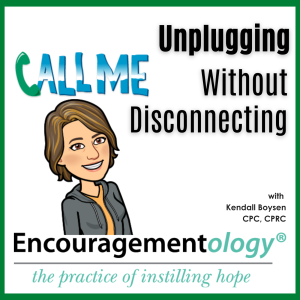
Tuesday Aug 03, 2021
Unplugging Without Disconnecting
Tuesday Aug 03, 2021
Tuesday Aug 03, 2021
SHOW NOTES:
On this show...we are seeking a new routine, unhooking from harmful habits, and finding creative ways to seek comfort and knowledge as we look at, unplugging without disconnecting. Let’s face it, autopilot has become well, automatic; without question or concern. This week loops into the next and then months become quarters and years get swallowed by decades. Before you know it, your sick, tired, and hungry for something more but you’ve been turned around so many times like a kid at a party with a blindfold and a bat - smacking away hoping to hit it big. Do you even know where the pinata is or what’s inside? To restart your life in a new direction you might need to take it back to idle to even determine what’s important and how far apart you are; from a wish to reality. This isn’t an isolated journey, so staying connected to the positive while you disconnect from the negative is vital.
I’m pretty confident it is not a new revelation that our minds may be overstimulated in today’s world. Everything we need to know, want to know, could even possibly fathom can be found on a device that fits in our hand. We are walking around with access to answer every question we could ever pose. Now, do we always get the right answer? Well, no, there are opinions mixed with factual studies competing for SEO-influenced positioning. So you’re satisfied with the first answer, chances are, it paid to be first instead of accurate.
This brings me to the lost art of wonder. To have an interest in knowing or learning something: to think about something with curiosity
Here are 5 Reasons to Let Your Mind Wander from Eric Scott Burton - Eric a writer on self-improvement, entrepreneurship, and mindset. He wants to help people overcome obstacles, grow, learn, and thrive.
This article is found on ericscottburton.com
- First, You Do This Naturally
- Second, It Helps You Focus
- Third, Mind Wander Opens Up Your Creativity
- Fourth, Mind Wander Lets You Comprehend Your Emotions
- Fifth, Mind Wander Can Help With Goal Setting
Ok - so now we see the importance of letting your mind soar instead of veering off course but when every second of the day seems to be filled with mind-numbing information, entertainment, and over-stimulation, when is that supposed to happen?
As with anything else, you will have to be intentional.
If it’s “new’s” you’re looking for you can get what’s happening and personal opinions, on your phone, on the web, at the newspaper stand (yes they still exist), and on the TV literally 24/7. The same headlines over and over and over again - so no need to rush if you missed it, it will be up again shortly.
If it’s entertainment you’re seeking then you’ve got it on any mobile device, on the computer, in a box, on a PlayStation, by yourself, or connected to people all over the world.
We haven’t even to tapped into the social side of things….want to participate, like, love, connect, creep, poke, wink, PM, DM. You can do this from any phone, computer, tablet. But what about people connecting, in person, and sharing? Is that as antiquated as, wonder?
Our brains are busier than ever before. We’re assaulted with facts, pseudo-facts, jibber-jabber, and rumor, all posing as information. Trying to figure out what you need to know and what you can ignore is exhausting.
So much good stuff in this article...take a listen!
Multitasking has been found to increase the production of the stress hormone cortisol as well as the fight-or-flight hormone adrenaline, which can overstimulate your brain and cause mental fog or scrambled thinking.
The title of this show is Unplugging Without Disconnecting because, it’s important to remember, stepping away from technology reliance shouldn’t interrupt your personal connections. If it does, you might need to re-evaluate the balance you have of in-person face-face connections and social media friends and followers.
Modern conveniences have made our life easier, there is no doubt about that but has it made it richer? Do you re-invest the extra time you save into growing your personal connections and experiences? People-need-people. To love, to nurture, to learn from, to be heard from, to encourage, to be encouraged, to support and be supported. You see the theme. You need them and they need you.
Sure you can send a message with one hand at lightning speed and inform someone of something important. But nothing can replace looking into another person’s eyes while they hear that news, watching their reaction, giving them a high-five, or a shoulder to cry on. Nothing can replace YOU.
Jennifer Latson offers us A Cure for Disconnection Loneliness is a problem of epidemic proportions, affecting millions from all walks of life. But while its roots are complex, remedies may be within reach. In an article, she wrote for psychologytoday.com
- DO TALK TO STRANGERS
- GIVE IT SEVEN MINUTES
- SCHEDULE FACE TIME
- IF YOU CAN'T GET FACE TIME, CHOOSE FACETIME
- USE FACEBOOK WISELY
- BE A GOOD NEIGHBOR
- THROW A DINNER PARTY
- GET CREATIVE
- TALK ABOUT IT
- REACH OUT AND TOUCH SOMEONE—LITERALLY
Key Highlights
- To wonder. To have an interest in knowing or learning something: to think about something with curiosity
- By allowing your mind to wander, you are processing the world around you and coming up with solutions.
- If you want to grow, you’re going to have to accept the bad stuff that comes with it.
- Although we think we’re doing several things at once, multitasking, this is a powerful and diabolical illusion.
- Multitasking has been found to increase the production of the stress hormone cortisol as well as the fight-or-flight hormone adrenaline, which can overstimulate your brain and cause mental fog or scrambled thinking.
- It’s important to remember, stepping away from technology reliance shouldn’t interrupt your personal connections.
- But nothing can replace looking into another person’s eyes while they hear that news, watching their reaction, giving them a high-five, or a shoulder to cry on.
- We can feel much better after just 30 seconds of talking to someone in person, whereas we don't get that benefit from online interaction."
- invite your neighbors over for coffee and offer to feed their cats when they go out of town. You'll be happier and healthier for it.
- Hugging, holding hands, or even just patting someone on the back is powerful medicine.
CHALLENGE: feeling overwhelmed and overstimulated? Unplug from the source of your discomfort. Let your mind wander without limits. Connect to those who breathe life and love into your world and reciprocate as you can.
I Know YOU Can Do It!
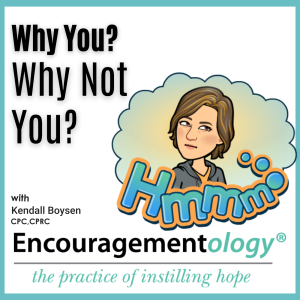
Tuesday Jul 27, 2021
Why You? Why Not You?
Tuesday Jul 27, 2021
Tuesday Jul 27, 2021
SHOW NOTES:
On this show….we are flipping the script and answering the call. Why You? Why Not You? Now, I didn’t come to this revelation on my own but I did adopt it as a way to overcome that woe-is-me kind of feeling. What if the things you’re struggling with are not the raw deal delivered by the universe that you think they are. What if these things happening to you are actually happening FOR you. No pain, no change. Sometimes we need to feel discomfort to seek comfort. What’s the lesson here? Shoot if we knew that it would ruin all the fun! Your journey is about discovery, challenges, and triumphs in no particular order and sometimes happening at random.
So...why you? How often do you ask yourself that question? It’s usually accompanied by an eye roll and an exasperated release of breath. UGH, WHY Me?
You might also echo that statement with things like….” figures, not again, not today, why is this always happening to me?
It can feel like life is out to get you or that terrible things are hovering over you just waiting to drop. Maybe you feel like you have a target on your back or a sign on your forehead but whatever it is….bad things happen to you.
And to make matters worse, they aren’t isolated incidents that happen once in a while. It’s blow after blow after blow! When are you going to catch a break?
This feeling is perpetual and once you’re on auto-repeat, it’s hard to shut it off. You start over-generalizing with overarching ideas like “ I ALWAYS, or I NEVER”. You shoot new opportunities down before you ever even try, accepting that nothing EVER works out for you so why bother.
- Feeling Stuck Reason 1: You Think There’s No Hope for Any Change
- Feeling Stuck Reason 2: You’re Stuck in a Dead-End Job
- Feeling Stuck Reason 3: You Don’t Like Where You Live
- Feeling Stuck Reason 4: Your Relationships Are Draining You
Someone once told me, “the day starts and ends with you”. I love these little nuggets of inspiration that burrow deep in your mind but are easy to recall to make sense of the world or to deliver just the right amount of momentum and focus.
You are in charge of how you react to challenging situations, the people involved, the innocent bystander, and even the thoughts in your head. You can see any situation as a good thing or a bad thing and you don’t even have to cock your head funny or close one eye. You have the power to view your life through different lenses.
When you wake in the morning, you are in charge of the first thought that enters your brain. Now, sometimes, circumstances make it very difficult to wake up to rainbows in the sky and bluebirds singing on your windowsill - but you can choose to use your circumstances as motivators instead of limiters. Your choice.
Robert Taibbi shares his ideas on a common feeling; When You Feel You Don't Deserve to Be Happy
Well, here are some of the common sources of self-sabotage, see if you identify with any:
- Past sin(s)
- Survivor’s guilt
- Trauma
- Parental worry
- Feeling guilty if you're happy
- Deserving happiness
- Make amends
- Realize you did the best you could do at the time
- Resolve your trauma
- Directly work on your self-criticism
- Directly treat your anxiety and/or depression
- Carry your life’s lessons forward
Before you can really identify the good AND bad in your life, you need a better vantage point. Why do you think it’s important to “find gratitude”? You know that is a huge buzz phrase but what does it really mean and why is there such a push to do it?
With gratitude, people acknowledge the goodness in their lives. ... Gratitude helps people feel more positive emotions, relish good experiences, improve their health, deal with adversity, and build strong relationships.
It helps climb you out of the darker regions in your mind to your frontal cortex where you can get a better vantage point. There you find patience, reason, and self-control.
Finding gratitude helps you put life into perspective. It delivers a healthy balance in what can seem like an overwhelming sea of negativity. With this new perspective, you can start to see the lessons and gifts instead of just the pain and misery.
enée Fishman enlightens us with 7 Ways That Life is Happening FOR You, Not TO You
- (1) To Teach You a Lesson
- (2) To Serve Your Awakening
- (3) To Catalyze Your Growth
- (4) To Deepen Your Empathy
- (5) To Test You
- (6) To Offer You Proof
- (7) To Help You Cultivate Trust
KEY HIGHLIGHTS -
- Feeling stuck starts with your thoughts.
- Realize that you are the one who created these thoughts, and you can be the one to create new thoughts.
- Take a step back. Assess your current relationships. If they are not bringing you joy, it’s time to do something about it.
- Regain your humanity by realizing just how much possibility you have, then seize the moment and do something about it.
- You are in charge of how you react to challenging situations, the people involved, the innocent bystander, and even the thoughts in your head.
- When your unhappiness has become your new normal, your view of yourself and what you present to others can feel unsettling and confusing
- If there is some regret, guilt, or wound that is haunting you and undermining your happiness, you want to find a way to put it to rest, to get some closure.
- Happiness is a byproduct of a life fully lived, a life based on self-care and forgiveness that can come with new intentions, deliberate action, support.
- A life hardship or challenge may arise to give you the tools you need to serve others more deeply or at a higher level. It can help us foster greater empathy and compassion for others.
- Sometimes the challenges we face are simply an opportunity to cultivate deeper trust that things will work out.
CHALLENGE: to answer the call. Instead of feeling like life is delivering another blow find the opportunity that stands on the other side of your thinking. Use your power and this new perspective to push forward and accept the challenge.
I Know YOU Can Do It!

Tuesday Jul 20, 2021
#WantMore #DoMore #BeMore
Tuesday Jul 20, 2021
Tuesday Jul 20, 2021
SHOW NOTES:
On this show...we are reaching for the stars, recognizing our power, and formulating a plan because the steps are achievable. Our new mantra? #wantmore #domore #bemore. It might actually sound too simple but isn’t that always the case; overcomplicating something so easy or missing what’s right in front of us by being stuck behind the shoulda, coulda, wouldas? Not today. We are going to break it down and work it forward and backward because the concept is the same no matter how you slice and dice it. You have the power and you’ve had it all along. Unless you are aware of a long line handing out personal power, you’re gonna have to seize it. That’s right, YOU have to want more, be willing to do more, to actually be more.
This idea came to me one morning, even the hashtags. I don’t know about you but I do my best brainstorming in the morning - usually in the shower. Come on, I know I’m not alone on that. As a life coach, my job is to take the overwhelming and make it simple to understand, easy to digest, offering a straightforward approach to moving forward. I’m well suited for that job because my mind works that way anyway. First, I’m a problem solver. Now that sounds like a resume cliche like; team player but it’s true. The main reason my mind goes into problem-solving mode quickly is that I don’t like being distressed. Really, it’s that simple.
Even a positive person who lets most things roll off her back has trials so let’s get that straight. I get down and yes even sometimes moody but I don’t stay there long. This sounds weird but my first thought is always….Is this going to kill me? The next thought….is someone in my family in harm's way? If not, then I have time to figure things out. I only panic if I’m late or if I’ve let someone down. Other than that I approach most things with a level head. Next, I try to gauge what I can control and what I can’t. I would love to believe that I am the superhero I feel like sometimes but the fact is, there is plenty that is out of my control. To which, I work on letting go.
It’s funny, I say “work” because sometimes it’s not as easy as doing a mic drop kind of release. Sometimes it feels like something is being pried from your hands down to your fingertips kind of release. Still, it’s letting go of things you can not change. This frees you to focus on what you can. Next, do an evaluation to see what’s the most pressing and what can wait. Low risk, high reward.
This type of process is logical and can get you over the hump to move forward. You can use these steps to tackle any challenge you face.
First, you have to activate it and then you have to own it. So before we can want more and do more….we have to know MORE is even possible.
Carla Moore gives us: 5 Ways to Activate Your Personal Power found on forbes.com
- Know your make and model.
- Punch in your destination.
- Shift from junkyard to showroom.
- Check the map.
- Choose your passengers.
Now you may say, Kendall, you are always talking about being satisfied with what you have and living in the moment. What happened to that?
This concept isn’t umbrella-style thinking and doesn’t encompass everything. The idea is, if you want to be more, you have to do more, and before you can do more, you have to want more. We aren’t motivated to do more if the want isn’t specifically tied to our own desires. Meaning, you can’t apply this process for something someone else wants for you or from you. This has to be your own wants, needs, and desires.
Simply accepting that you are where you are (mentally, physically, or spiritually) as a result of someone else's stronghold or some opportunity that passed over you is not an example of activating your power.
Bonnie Marcus helps us with 10 Steps To Own Your Personal Power found on forbes.com
- Acknowledge and declare your ambition.
- Replace negative self-talk with positive affirmations.
- Advocate for yourself and others.
- Ask for help when you need it.
- Speak up and share your opinions and ideas.
- Acknowledge your fears.
- Schedule quiet time.
- Build a supportive network.
- Maintain a growth mindset.
- Practice self-care.
Recently, I walked along the beach looking at the ocean. I was in awe of the vastness, the soothing rhythms of the waves meeting the sand, its consistency, and its power. I realized I was standing on the fringes of such an amazing wonder. All the chaos of life was happening on just the edges. WOW When you need perspective, look to nature.
We can get so enamored with this false sense of reality; moving pictures telling a story, loosely based on reality or fiction. We can feel traumatized without even knowing we were assaulted by the messages. But turning my head in the opposite direction I realized; life will go on without my input. I don’t have to control everything or feel the responsibility for the weight of the world. The tide will still come in.
- No. 1: Happiness
- No. 2: Money
- No. 3: Freedom
- No. 4: Peace
- No. 5: Joy
- No. 6: Balance
- No. 7: Fulfillment
- No. 8: Confidence
Today we need deliverables; sayings we can glom onto and put in our pocket or on our Twitter feeds. Ideas are broken down, simple, easy to remember.
Do you want more? What are you prepared to do?
Research, explore, educate, connect.
Do you want to be more? What are you prepared to do?
Learn, listen, strive, instill, reach
With this recipe, you have the power to activate your action plan...today!
CHALLENGE: Take some time in the quiet to listen to your heart. What do you want? Be willing to do the research, connect, commit, overcome, and persevere remembering; #wantmore, #domore, #bemore.
I Know YOU Can Do It!
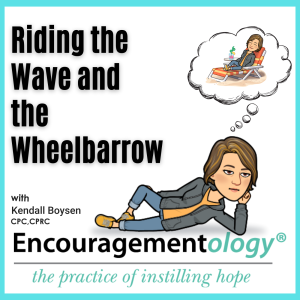
Tuesday Jul 13, 2021
Riding the Wave and the Wheelbarrow
Tuesday Jul 13, 2021
Tuesday Jul 13, 2021
SHOW NOTES:
On this show...we’re talking about settling in, taking life as it comes, and letting someone else lighten the load when needed. This show is about riding the wave and the wheelbarrow. You might find swimming upstream and waging a battle against the current the only possible way to survive. The thought of letting go, come what may, or not willing into existence everything you have, simply a pipe dream. But what if…..go on this fantastical journey with me, what if you stopped fighting and instead floated along with the current. Taking things as they come instead of worrying about what might happen if you aren’t in control. What if….stay with me, you let someone else pick up the slack or start doing their share? Could you relax in the knowledge that all you have to focus on is doing your personal best, instead of saving the world?
So if I said the words “go with the flow”, what ideas immediately come to mind? It might sound peaceful to you, a pass, being let off the hook. An excuse to relax or a direct order to chill out, you’re not in charge.
It might elicit anxiety. A foreign concept where you relinquish control. Taking a step back, sacrificing structure for something more freeform.
I’ve always thought of myself as easy-going, a person who goes with the flow. Matt actually laughed out loud at this. He said I was anything but easy-going and then referred to my lists, my need to devise a plan in advance, my disappointment when things didn’t turn out as I expected, my need for control, blah blah blah….I tuned him out at that point.
But he was right. I’m not easy-going but I do think I’m flexible. I do well with change and can shift gears with ease. Ok flexible, I’ll accept that
1-Other people’s opinions.
2- Having to please other people. (Oh those expectations!)
3 -Saying yes to everyone. And their cousin’s neighbor’s mother.
4- Anything that stops you from asking for clarification, time, help, patience, understanding, space.
5- Judging, criticizing, complaining. (And if you’re about to skip this because ‘you’d never do that to anyone, it includes doing it to yourself, too!)
6 -Excuses.
7 -Letting idiots, jerks, and toxics change who you are.
8 -Thinking only the big things should be celebrated.
9-Talking, shutting down, or getting busy – when it would be best to listen.
10 -The need to be right.
11 -Holding back.
12 -The need for control.
13-The Resistance to Change.
14 -Regret
15-Blame
The waves are coming in, pounding the beach. What do you do? Stand there and take it? Pushing against them, getting the wind knocked out of you, standing up when you can, and going at it harder the next time. Or do you let the wave carry you, weightless over the swells and down the beach as you look up to the clear sky without worry as to where you will eventually come to shore?
Oh to be that trusting and vulnerable. The visual of that sounds so hopeful and peaceful. Then why, do we panic and paddle with all our might in the opposite direction? Convinced we have control over everything, even the unseen.
Acknowledging your power doesn’t always mean being forceful. It can be the power to understand what’s needed at any given moment. Knowing when to push and when to be carried.
Imaging a wheelbarrow. One wheel and two handles. A wheelbarrow doesn’t have a steering wheel, pedals, or brakes. It’s powerless for the passenger. All the control goes into the hands of the diver.
How do you feel about climbing in - arms and legs, hands and feet. Taking a rest and letting someone else lead the way?
Cynthia Kane give us: 6 Ways to Let Others Help You found on bustle.com
Shift Your Perspective
Know Your Worth
Know What you Believe
Know Your Strengths
Know when to Ask for Help
Listen
Have you ever heard, all good managers delegate all jobs? I bet in the same breath you’re thinking, yeah but it’s easier if I just do it myself, then I know it gets done, and to my standards.
Listen to yourself….to your standard? Maybe that’s a bigger issue but your expectations are your expectations. Waiting for others to live up to them will produce anxiety, disappointment, and heartache.
What if you could effectively communicate what you want and need and then let others do THEIR BEST, would that be good enough?
5 Habits To Help You Rid Yourself Of Perfectionism
- Accept the fact that you are NOT the only person on the planet that can do anything right.
- Redefine your standards.
- Focus on WHY you're doing something, not WHAT you're doing.
- Learn to set realistic goals that you can enjoy achieving.
- Learn how to celebrate your success.
CHALLENGE: take a time out. Relax and go with the flow. Let life carry you through the ebbs and flows. When in need, pull back and let someone else do the heavy lifting. Your strength is found within.
I Know YOU Can Do It!
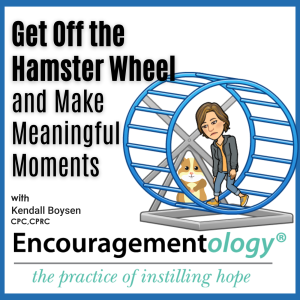
Tuesday Jul 06, 2021
Get Off the Hamster Wheel and Make Meaningful Moments
Tuesday Jul 06, 2021
Tuesday Jul 06, 2021
SHOW NOTES:
On this show...we are poking a stick in it, turning off auto-pilot, and getting off the hamster wheel. No longer are we going to walk through life wondering where we are going and “what just happened?”. SNAP - time to wake up for some intentional and meaningful moments. That’s right, intentional. How will you approach each day; Wondering where the time went or finding unique ways to experience, connect, understand, and document? The hamster wheel suggests a whole lot of action but not really getting anywhere. When you sit down at night, after a long day of who knows what, where does your mind go; glad it’s over or trying to put shape to the blur? Instead of allowing time to slip away unnoticed, let’s dig into these questions and add meaning.
I read this quote in a book recently: We’re young for such a small fraction of our lives, and yet our youth seems to stretch on forever. Then we’re old for years and years, but time flies by fastest then.
I’m sure everyone is nodding their head no matter what your age is. We all have 365 days in a year and endless opportunities to find meaning. We also start out with a somewhat blank slate and add experiences and memories as we go.
What stands out? I’m sure your mind goes to major milestones in your life.
What happens to all the moments in between? Why didn’t they make the vault of memories you value? How much of your life was spent waiting and pondering the next meaningful moment?
Interesting research about the reminiscence effect…
One theory behind the reminiscence bump is that our teens and early adulthood years are our defining years, our formative years. Our identity and sense of self is developing at that time, and some studies suggest that experiences linked to who we see ourselves as are more frequently retold in explaining who we are and are therefore remembered better later in life.
One study found that 73 percent of people’s vivid memories were either first-time experiences or unique events.
If we want life to slow down, to make moments memorable and our lives unforgettable, we may want to remember to harness the power of firsts. In our daily routines, it’s also an idea to consider how we can turn the ordinary into something more extraordinary in order to stretch the river of time.
I find that doing something with my hands, creating something, writing something - can make for a meaningful moment. For instance, I love crocheting. Hear me out. Something in my brain finds comfort in a repetitive motion. Another part of my brain is satisfied when I take unformed items and create forms - like fabric into a garment, paper scraps into a card, and yarn into a hat, scarf, or blanket. This repetitive motion of winding yarn in different patterns can create a hat you wear to give you comfort. JOY! Then there is this wire that becomes obsessed with a project so I’ve created over 100 hats!
Obviously, I don’t have 100 cold children or adults in my family who need hats so I’ve looked for other outlets to donate hats. For me, that’s meaningful.
What is the hamster wheel, even? The dictionary hints at an unfulfilling activity leading nowhere, but our modern-day interpretation builds more into it than that.
“Am I living my life the way I want to? Am I investing my time in a way that fulfills me?”
Here are some ideas on how to do more with less and refocus your life on meaningful moments:
- Clear out your home
- Switch careers
- Move to the countryside
- Lower your expenses
- Work less
- Start freelancing (when possible)
- Grow your own vegetables
- Move to a smaller city or town
- Downsize
I love all those ideas and especially the whole concept of live slow, run far. What’s the rush?? A friend was telling me about a book he read referencing the 33,000 days that the average person has to live. Whoa…..looking at time with that perspective is a bit daunting. Already I feel behind the eight ball. But if you could look at your life with a finite sense of time, would that change your outlook? Would that motivate you to live life to its fullest, never wasting a moment?
Tim McGraw sings “live like you were dying”. This is poignant because most people who are faced with that prospect or have witnessed a near-death experience have echoed that they now view their day-to-day differently and as a result, pack in moments that are meaningful.
There are endless quotes about happiness and in the end what held the most meaning and they all point to our connections. I’m sure I don’t need to point out that these are personal or in-person connections, not Facebook friends or Twitter followers.
It’s connecting, listening, sharing, understanding, and encouraging the people in our lives. The ones we call our “people” and the ones we’ve yet to meet.
1 -Healthy Relationships
2 -Family
3 -Yourself
4-Your friends
5 -Love in all shapes and sizes
6 - Passion
7 -Time and productivity
8 - Good health
9 -Wellness
10 -Reason to live
CHALLENGE: make an intentional effort to step off the hamster wheel to seek meaning through connection, purpose, creativity, and experience. Collect memories that tell a story of making the most of every moment.
I Know YOU Can Do It!
